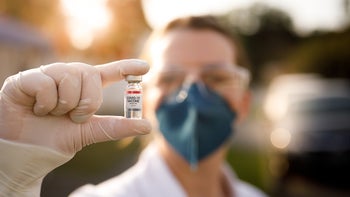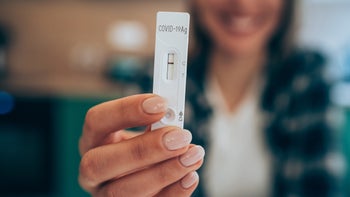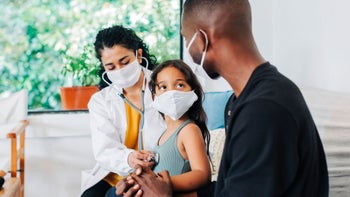
Can You Take Tylenol or Advil Before or After Getting a COVID Vaccine?
Key takeaways:
The COVID-19 vaccine may cause side effects, such as a low fever or body aches. It’s generally OK to take an over-the-counter (OTC) pain reliever such as Tylenol (acetaminophen) after a COVID vaccine if side effects are bothersome.
It’s best to avoid taking OTC pain medications before receiving your COVID shot. There’s not much evidence they will prevent side effects. There’s also a chance they could make the vaccine less effective if you take them in advance.
If you take a pain medication regularly, talk to your healthcare team for guidance before getting a COVID vaccine. Don’t stop taking your medication on your own.
Access savings on related medications
Table of contents
Just like all vaccines, COVID-19 vaccines have side effects. Common side effects of COVID vaccines include pain where you received the shot, fever, and tiredness. They may not be comfortable, but these are often signs that your immune system is responding to the vaccine.
Even though these reactions usually go away quickly for most people, no one likes to feel them. An over-the-counter (OTC) pain reliever or fever reducer, such as Tylenol (acetaminophen) or Advil (ibuprofen), may help reduce side effects. But can you take Tylenol after a COVID vaccine? Here’s what the science says.
Can you take Tylenol or Advil after receiving a COVID vaccine?
Yes, if you’re having side effects, it’s perfectly fine to take a pain reliever such as Tylenol or Advil after you receive a COVID vaccine. Pain or a low fever after a vaccine are normal reactions. They’re also a sign your immune system is responding to the vaccine. So taking Tylenol or Advil at this point shouldn’t interfere with how well the vaccine works. Evidence from the clinical trials of COVID vaccines backs this up. There was no sign that taking a pain reliever after receiving the vaccine interfered with its efficacy.
Keep in mind that most COVID shot side effects are mild and will go away on their own. Applying a cold or warm compress and staying hydrated may be enough to manage them in the meantime. It’s also a good idea to get a healthcare professional’s OK before turning to an OTC pain reliever. Nonsteroidal anti-inflammatory drugs (NSAIDs) in particular aren’t a safe option for everyone.
Is it safe to take OTC pain and fever reducers like Tylenol or Advil before getting a COVID vaccine?
The short answer: we don’t know. This question hasn’t been researched much for any vaccination — not just the COVID vaccines. Because of this uncertainty, both the CDC and the Advisory Committee on Immunization Practices recommend avoiding pain and fever reducers before getting any vaccine. Think of it as erring on the side of caution.
There are two main concerns with taking pain and fever medications before a vaccine. The first is whether or not they’re even effective at preventing vaccine side effects. The other is whether these medications may interfere with how well the vaccine works. Let’s take a closer look at each of these concerns.
Can taking OTC pain relievers before getting the COVID vaccine help prevent side effects?
There’s not much evidence, so we don’t know for sure.
A small study from 2009 looked at infants receiving regular childhood vaccinations. Some of the children were given Tylenol before their shots, while others were not. The researchers found that infants who took Tylenol were less likely to get a fever after vaccination.
A 2017 study found that Tylenol or Advil helped prevent a fever in infants on the day they received routine vaccinations. In this study, Tylenol was found to be better at preventing fever than Advil. In fact, infants who took Advil were even more likely to experience a fever than those who received no pain relievers at all.
COVID vaccine side effects: Learn about common and rare side effects of COVID-19 vaccines, how to manage them, and when to seek medical care.
COVID treatments: Read up on the currently available COVID treatments and what’s being developed for the future.
How effective are COVID vaccines? Track the latest news on the effectiveness of COVID vaccines.
Available studies have focused on fever reduction and prevention. There isn’t much information available on whether pain relievers help prevent pain or discomfort from vaccines.
Since these studies are small and focused on infants, we need more research to say whether taking Tylenol or Advil would help prevent vaccine side effects for most people. It’s also important to note that fever and pain from vaccines is typically mild and fast-passing.
What’s more, the researchers in these studies all recommended avoiding pain relievers before vaccines because of their potential impact on immune response — more on that next.
How do pain relievers impact the immune response of vaccines?
In short: Pain relievers might cause a weaker response to vaccines. So it’s best to avoid taking them before your COVID shot in an effort to prevent side effects. Seemingly, it’s better wait and take a pain reliever after you’ve received your vaccine if side effects are bothersome.
But why? Well, it has to do with inflammation (swelling), a natural part of the healing process when you’re sick or injured. As your immune cells work to fight off bacteria or viruses, reactions like swelling, redness, or fever can happen. This can be uncomfortable, but it’s actually beneficial. Inflammation helps kill off the invading germs while your immune system creates antibodies. These antibodies are special proteins that will remember the germ and fight it off if you come into contact with it again.
This same process occurs when you get a COVID vaccine (or any other immunization). Your immune system recognizes the vaccine as a foreign substance and reacts to it, which causes inflammation and antibody formation. Typically, the response to a vaccine is much milder compared to when you’re actually sick with the condition it’s protecting you from. But it can still lead to side effects, including pain and fever, shortly after your vaccination.
The issue is that pain relievers, such as Tylenol or Advil, interfere with this natural process. They can reduce your immune system’s inflammatory response. This can be helpful when you’re hurt or sick. But if you take a pain medication before getting a vaccine, it could prevent your immune system from responding to it as well. We don’t know for sure how likely this is. But to be safe, experts recommend avoiding these medications before receiving a vaccine.
Will taking a pain reliever like Tylenol make the COVID vaccine less effective?
As mentioned, taking a pain reliever after you receive your COVID vaccine shouldn’t be a problem. But the effect of taking pain relievers before receiving your COVID shot hasn’t been heavily studied.
One small study on the AstraZeneca vaccine (AZD1222) suggested that taking Tylenol before vaccination is unlikely to affect the immune system’s response to it. This study didn’t look at people who took Advil or other pain relievers before vaccination.
Another small study on the Pfizer mRNA vaccine (BNT162b2) also showed that taking Tylenol or Advil before receiving the vaccine didn’t impact the immune response.
While promising, this isn’t enough evidence to say for sure that it’s safe to take a pain medication before receiving a COVID vaccine. It’s better to wait until after your shot and treat side effects if and when they appear.
If you take pain medications for another condition, is it safe to continue taking it when getting a COVID vaccine?
As discussed above, there’s not much evidence one way or the other on whether OTC pain relievers make COVID vaccines less effective. It could actually be much riskier for you to stop any regular medications. For example, stopping a daily low-dose aspirin can raise your risk of heart problems or blood clots. And stopping NSAIDs taken for arthritis or other conditions can worsen or cause a flare-up of your symptoms.
If you regularly take any medications that contain Tylenol or NSAIDs (including aspirin), speak to your healthcare team about whether you should continue them while receiving your COVID vaccine. They can review your personal medical history and let you know if you should stop taking them a few days beforehand.
Frequently asked questions
Yes, OTC pain and fever reducers can help treat fever, body aches, and sinus pain caused by COVID. Early in the pandemic, there was some concern that NSAIDs, such as ibuprofen, could make COVID symptoms worse. But this was proven to not be true once more information was available. Still, it’s best to check with your healthcare team before taking an OTC pain medication to make sure it’s safe for you.
No, antibiotics work against bacteria, not viruses. The COVID vaccines don’t contain bacteria. Instead, they contain proteins that stimulate your immune system to make antibodies against the COVID vaccine. This can help prevent you from getting sick with COVID, or ensure that your symptoms are less severe if you do get sick. Antibiotics aren’t effective against these proteins, so they won’t interfere with a COVID vaccine.
The side effects from a COVID vaccine are typically mild and go away on their own after a few days. If you get the COVID vaccine along with your annual flu shot, side effects such as headache or fatigue are more likely. But they should still resolve after a few days. If side effects worsen or persist longer than that, reach out to your healthcare team for guidance.
The bottom line
It’s common to have a sore arm, fatigue, or even a fever after your COVID-19 vaccine. These are signs that your immune system is reacting to the vaccine. COVID vaccine side effects are typically mild and resolve on their own after a few days. But if needed, it’s fine to take an over-the-counter pain and fever reducer, such as Tylenol (acetaminophen) or Advil (ibuprofen) after you receive a COVID vaccine.
It’s best to avoid taking an OTC pain medication before your COVID vaccine in an effort to prevent side effects. This is because there’s a possibility that OTC pain relievers, such as Tylenol or Advil, might weaken your immune system’s response to vaccines.
If you have a health condition that requires you to take pain relievers regularly, speak to your healthcare team. They can help you determine whether it’s OK to keep taking these medications before getting your COVID vaccine. Don’t stop taking any routine medications on your own.
Why trust our experts?



References
AstraZeneca. (2020). COVID-19 vaccine AstraZeneca.
Aziz, M., et al. (2023). Physiology, antibody. StatPearls.
Centers for Disease Control and Prevention. (2023). Vaccine administration.
Centers for Disease Control and Prevention. (2024). Getting your COVID-19 vaccine.
Folegatti, P. M., et al. (2020). Safety and immunogenicity of the ChAdOx1 nCoV-19 vaccine against SARS-CoV-2: A preliminary report of a phase 1/2, single-blind, randomised controlled trial. The Lancet.
Immunize.org. (2023). Ask the experts: Administering vaccines.
Laughey, W., et al. (2023). Ibuprofen, other NSAIDs and COVID-19: A narrative review. Inflammopharmacology.
National Foundation for Infectious Diseases. (n.d.). COVID-19 vaccines FAQ.
Prymula, R., et al. (2009). Effect of prophylactic paracetamol administration at time of vaccination on febrile reactions and antibody responses in children: Two open-label, randomised controlled trials. The Lancet.
Tani, N., et al. (2022). No significant influence of pre-vaccination antipyretic use on specific antibody response to a BNT162b2 vaccine booster against COVID-19. Vaccine: X.
World Health Organization. (2020). The Pfizer BioNTech (BNT162b2) COVID-19 vaccine: What you need to know.
Wysocki, J., et al. (2017). A randomized study of fever prophylaxis and the immunogenicity of routine pediatric vaccinations. Vaccine.
























